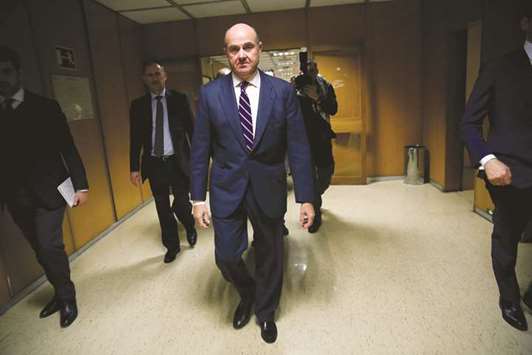Spain’s Economy Minister Luis de Guindos yesterday said he was confident he would be offered the vice-presidency of the European Central Bank, with Ireland’s central bank governor Philip Lane the only other candidate.
The final decision will not be taken for a number of weeks but senior eurozone sources told Reuters the Spanish economy minister was a clear favourite to replace Portugal’s Vitor Constancio, whose eight-year term ends May 31.
The race to be the ECB’s number two kicks off two years of change within the bank’s executive board, which consists of four board members, the vice president and president and it will set the tone for the fight for the ECB’s top job.
Yesterday is the deadline for candidates and only Lane and de Guindos have applied.
“The prime minister and myself have received support and we believe that there is a very clear possibility of me being elected,” de Guindos said during a conference in Madrid.
Markets are watching to see who will take the second most senior position at the bank, which controls monetary policy for the 19-country eurozone and is preparing to replace Italy’s Mario Draghi at the helm next year.
“As the ECB’s focus shifts towards an unwinding of accommodative monetary policy, the market is focusing more on individual speakers in an attempt to gauge how the exit will take shape,” BofA Merrill Lynch said in an investors note.
The Working Group (EWG) of deputy finance ministers and treasurers who prepare Eurogroup meetings will meet today to discuss who to back for the position.
Eurozone finance ministers will vote on February 19 for the ECB candidate, ahead of a European Parliament hearing and final appointment by EU leaders.
De Guindos, 58, may face some opposition due to his close alignment with hardline German positions throughout the European economic crisis.
Meanwhile, eurozone sources contacted by Reuters have expressed concerns that his election as a southern European from a so-called periphery economy could mean, in the name of balance, Draghi would be replaced by a northern European from a core economy in 2019.
Lane’s selection would be first time Ireland was represented on the ECB board since the eurozone’s inception in 1999.
Spain was represented in Frankfurt by Jose Manuel Gonzalez Paramo until he left in 2012.
De Guindos has been Spain’s economy minister since the conservative People’s Party (PP), headed by Prime Minister Mariano Rajoy, won the 2011 election and has helped steer the country though its worst economic crisis in decades.
Before taking the helm at the Economy Ministry, de Guindos worked as a head of the financial sector in PricewaterhouseCoopers in Madrid and as head of Nomura Securities and Lehman Brothers in the Iberian peninsular before that.
Under him as economy minister, European authorities orchestrated a rescue of Spain’s then sixth-biggest lender, Banco Popular, in early June 2017, the first time a bank in the eurozone was wound down according to the new resolution framework.
The ECB became the single supervisor for around 120 banks in the eurozone in November of 2014.
At a time when the ECB is working on a draft of new measures targeting soured loans on bank balance sheets, de Guindos can be credited for helping Spain’s financial sector reduce its non-performing loans to around 8%.
Lane, meanwhile, has acted as an academic consultant for the European Commission, International Monetary Fund, World Bank and a number of central banks, including the ECB.
The European Parliament is also calling for governments to propose a female candidate and Spain’s Socialists called on Tuesday for Rajoy to propose a female technocrat.
There is one woman on the six-member board and two on the ECB’s 25-member governing council.

Spain’s Economy Minister Luis de Guindos leaves after a news conference at the ministry headquarters in Madrid yesterday. De Guindos has been Spain’s economy minister since the conservative People’s Party, headed by Prime Minister Mariano Rajoy, won the 2011 election and has helped steer the country though its worst economic crisis.
